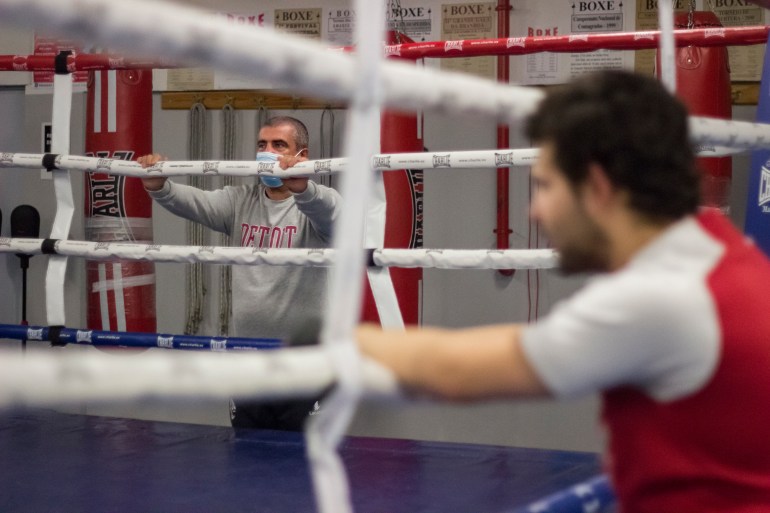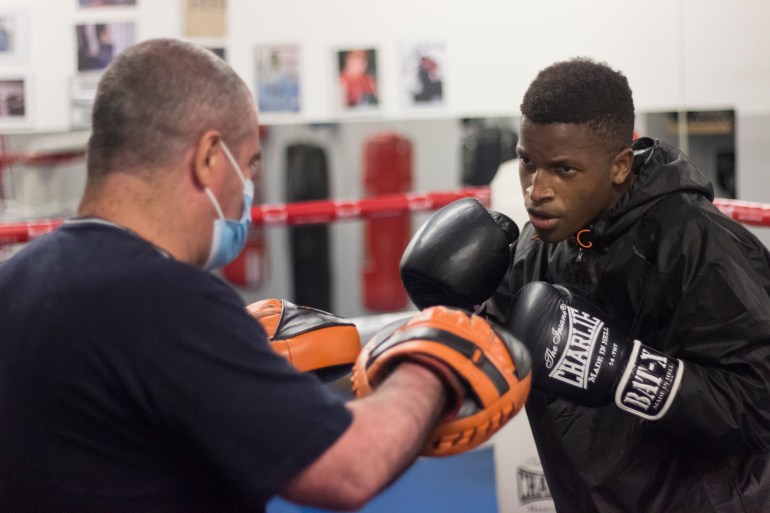Portugal: A boxing club shaping lives through social integration
Coach Ramalho is not only training champions inside the ring but promoting social integration, education and employability outside it.

Lisbon, Portugal – Inside the Antonio Ramalho Boxing Spirit gym, located in the social housing of Outurela in Lisbon’s suburbs, 7pm marks peak hour.
Inside the long dark corridor situated in the basement of the local sports centre, one can already hear the swing of the punching bags and the gloves hitting them with might.
Keep reading
list of 3 itemsSyrian boxer competes ‘for all refugees’ at Tokyo Olympics
How athletics is helping India’s Siddi community gain recognition
“You three go for a run with Wilson,” says a commanding voice.
“Welcome,” says the same voice.
This was the voice of coach Antonio Ramalho, also known as Mestre, founder of the gym.
A timer on the wall beeps. Time for a break. Surrounding the timer are photos from bouts, of athletes and special moments.
In the gym, people from all walks of life have gathered – engineers, lawyers, architects, nurses, policemen, students, former prisoners.
“From the time someone walks across that door, the only thing that matters is if they have good character,” said Ramalho.

As the timer beeps again, a group of youngsters start to shadowbox. One of them is Wilson Semedo, who arrived in Portugal from Cape Verde in 2012, at the age of 13.
Semedo dropped out of school and joined the gym in 2016. Despite being in Portugal for four years, he spoke only Kriolu and was having difficulties adjusting to his new life.
“I was not an easy kid. I had an explosive temper and I was hanging out with friends that only did bad stuff,” Semedo said. “At 15, all I was doing was going out and drinking.”
But he says the discipline and attentive eye of Ramalho changed his life.
Everyone had “given up on him”, said Ramalho.
“He was rude, wild, had no goals in life … it was also difficult for me at the start. He told me he wanted to compete so I started setting some goals besides boxing: Be more polite and get back to studies or work.”
With boxing taking up most of his time, Semedo quit the bad company and the nightlife. He started training every day – morning and afternoon – and found a part-time job.

After a lot of sweat and sparring sessions with older athletes in the gym, Wilson stepped inside the ring. His outstanding performances in amateur tournaments in Portugal attracted the attention of the Cape Verdean Boxing Federation and in 2018 boxing took him to his home country to compete.
He represented his country at the 2019 African Games but was not able to qualify for the Olympics.
Undeterred, Semedo pledged to carry on.
“Boxing has given me everything. It helped me to not fight on the street and to respect others,” he said.
“It feels that I was born for boxing. It gave me discipline, concentration and focus.”
As his technique and dedication improved, Ramalho entrusted him with teaching boxing to the youngsters.
Kevin Sanches, also from Cape Verde, arrived a year after Semedo.
Both sets of parents came to Portugal looking for a job and a shot at “a better life”.
Inspired by a boxing-themed anime, Sanches started training at the gym in 2018, aged 14.

“I wasn’t really good at school because I don’t feel motivated,” said Sanches.
“But I’m smart at boxing. I used to help the newcomers after my training and I realised that I was also evolving. So I started thinking about becoming a boxing coach or a personal trainer.”
‘Ready to take a risk’
Sanches went on to take a professional course in sports in high school and when the time came for the internship, Ramalho invited him to teach boxing to the children.
After each training session, Sanches collects food for his family from a social organisation that supports households in the neighbourhood.
“My mother wakes up at 4:30am. She works two jobs. My father works on ships. I don’t ask him for anything that is not really necessary because he is always complaining of body aches. He bought some boxing material so I can practise at home. He is glad that I’m finally focusing on something rather than my phone.”
Both youngsters owe the changes in their life to Ramalho, who was born and raised in a middle-class neighbourhood in Lisbon’s suburbs.
He started training children by chance. After 12 years as a professional boxer, he opened his first gym in 1988, in a small room on top of a restaurant.
“On the first day, there were only children who turned up,” said Ramalho.
“None of them were old enough to box. The first child I trained had a t-shirt down to his feet. He did not even weigh enough for boxing.”

He decided to work with what he had.
Twelve years later, at the 2000 European Cadet Boxing Championship in Greece, two of the six young boxers representing Portugal were from his gym.
For the next five years, those two, followed by others, won “everything that there was to be won”, he said.
A club that no one knew about was writing part of Portuguese boxing history.
“At that time, there were many clubs in Portugal but they did not compete abroad. I was a young coach, I wanted more and I was ready to take a risk. I used to take my athletes to compete in Spain because I had contacts from the time I was a boxer myself.”
‘Importance for the community’
Ramalho moved to the sport centre’s basement in 2007, in a room offered by the municipality as an appreciation for the work he has had done.
The room became too small as more people joined. Now, he is about to have four rooms, in addition to the outdoor training space he is using due to the coronavirus pandemic.
“I present new projects to the company that manages the site and they have been very supportive and giving me more rooms because they understand the importance for the community,” he said.
In the administrative room, awards and medals cover walls, shelves and tables.
Last year, Ramalho was nominated as Sports Ethics Ambassador by the National Plan of Ethics in Sports and Hero of Humanity by the World Boxing Council (WBC) for his social work.

His most impressive accomplishment, however, is the study centre.
Opened in 2015, the centre has computers, a library and a snack corner. Volunteers help the children with homework and exam preparation.
Ramalho has recently joined the EU programme Erasmus+ and partnered with two similar organisations in Romania and Italy to organise cultural exchange and increase education and employability opportunities for his young athletes.
He now wants to open an art room.
“With time, I realised that boxing is a powerful tool to attract these children but it might not give them the continuity they wish. That’s why we combine boxing with education and employability opportunities. The goal is to use sports, which is a powerful tool to shape people, but we also have to open doors for them for other things.”
Salvador Carrizosa was 11 when he switched from rugby to boxing as, he realised later, the latter “taught self-control, sacrifice and courage”.
“Not the kind of courage to challenge others but to face my own fears and difficulties.”

He has just finished high school and wants to work in the stock market.
“It is flexible work so I can combine it with boxing. And even if I can’t do professional boxing, I will stay connected to the gym.
“It doesn’t matter if you are Floyd Mayweather or a newcomer, everyone is respected equally. And the one who knows more helps the other. And that other will probably do the same. This goes beyond the gym. That’s what makes this place so special”.
All of Ramalho’s trainees agree on two things: Boxing made them less aggressive outside the ring and Ramalho is like a second father.
“I came to boxing after my grandfather, who was like a father to me, died,” said Carrizosa.
“Mestre continued the work he was doing by showing me how to be an honourable man. He helped me overcome my loss, get back on track and help my family. What I learn with the boxing family, I take it home to my mother and sister. He is shaping me for life.”
‘I’m already winning’
Miriam Silva, who lives near the gym, started boxing when she was eight but left to try other sports. But in 2018, she was back.
“I came back because I like this sport and I feel very good here,” Silva said.
“I used to think that because I’m a girl, I would not get that far as boys. A lot of people outside the gym say that. But that’s not true. Mestre motivates me a lot. Sometimes he sits next to me and tells me what I can do better. All those motivational posts he shares on the social media of the gym, he tells me to put them inside my head and not forget.”
At 17, Silva is not only competing in the ring, but also teaching boxing to young children, just like Semendo and Sanches. And receiving an allowance to do that.

Ramalho puts his social and human outlook on sports down to missing the support of his coach in his younger days.
“I started boxing when I was 13. Someone my age was not even allowed to compete but I was skilful so I was thrown to the wolves. I could have grown up differently in boxing but I was missing the support of my coach. He didn’t talk much to me.
“Now, when I sit down with my boxers and talk to them, I wish someone would have cared so much for me as I care for these kids.”
As with any boxing club, having boxers competing and winning is very important for a coach but, he says, “right now, if I have a kid who likes being here, who trains with dedication and likes helping others, I’m already winning.”